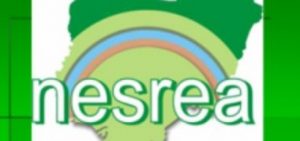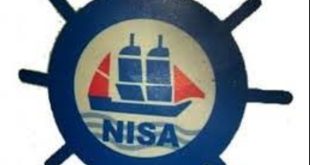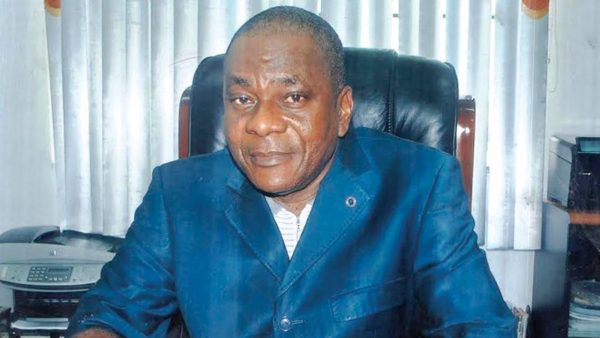 National Environmental Standards Regulatory and Enforcement Agency (NESREA) has dispelled rumours that the agency was at loggerheads with the Standards Organization of Nigeria (SON) following NESREA’s move to replace SONCAP at the ports.
National Environmental Standards Regulatory and Enforcement Agency (NESREA) has dispelled rumours that the agency was at loggerheads with the Standards Organization of Nigeria (SON) following NESREA’s move to replace SONCAP at the ports.
The Director, Planning and Policy Analysis at NESREA, Mr. Victor Ojogbo revealed this to MMS Plus newspaper during an exclusive chat yesterday.
According to the NESREA boss, the agency was working in sync with SON and its sister agency, National Agency for Food, Drug Administration and Control (NAFDAC) on all its initiatives.
“We have no conflict with SON. We have been talking and the policy was reached in agreement with them. The procedure is clear, NESREA issues Form ‘M’ or clears an importer when weare sure there is a SONCAP. It is the same with NAFDAC; when you have NAFDAC clearance then NESREA can proceed with its clearance. Besides nobody has invited the SON and NESREA on account of any conflict anywhere” Ojogbo said.

Meanwhile, the Head of Research, Sea Empowerment & Research Centre, Dr. Eugene Nweke has faulted the move by NESREA to replace SONCAP with its clearance certificate as a deliberate effort to create import/product regulatory conflicts in the nation’s International Trade and Security Supply Chain (ITSSC).
Nweke who made this submission in a letter he addressed to the Coordinator, Business Environment Secretariat of the Nigerian Investment Promotion Council and obtained by Primetime Reporters, stated that such move if allowed would be counterproductive to the canvassed objectives of the presidential directives on the ease of doing business.
Find details of the letter below;
The Coordinator,
Business Environment Secretariat (EBES),
Nigeria Investment Promotion Council,
4th Floor, Aguiyi Ironsi Way,
Maitama Abuja.
Attention: Dr. B.Oduwole.
Dear Sir,
RE: “HOW NESREA CLEARANCE PERMIT REPLACES SONCAP”.
We refer to the above import business news article (https://www.clearingandforwardingnigeria.com/how-nesrea-clearnce-permit-replaces-soncap/) powered by Word Press and Wellington was published and circulated online in its publication of 25th May, 2018.
Sir, if this 13 pages import business news article, as captioned above is anything to go by, then, I make bold to state that, there exists a seeming import/product regulatory conflicts in our International Trade and Security Supply Chain (ITSSC), which may tantamount to counterproductive to the canvassed objectives of the presidential directives on the ease of doing business.
The import business news article, for all intent and purposes dwelled on NESREA Environmental Clearance Permit, and noted thus:
A). It noted eight (8) items exempted from SON.
b). It listed items regulated by NESREA to include and not limited to:
i). Nineteen (19) import items categorized as large household appliance (white goods).
II). Twelve (12) import items categorized as Small household appliances (white goods).
iii). Twenty (20) import items categorized as ICT and telecommunication equipment (Grey goods).
iv). Eight (8) import items categorized as Entertainment and Consumer Equipment.
v). Six (6) import items categorized as Lightening Equipment
vi). Eight (8) import items categorized as Electrical and Electrical Tools.
vii). Six (6) import items categorized as Toys, Leisure and Sports Equipment.
viii). Eight (8) import items categorized as Medical Devices (with the exception of all implanted and infected products).
ix). Four (4) import items categorized as Monitoring and Control Instruments.
x). Five (5) import items categorized as Automatic Dispensers.
xi). Two (2) imports items, generators & transformers categorized as “Others”.
xii). Eleven (11) import items categorized as “Categories of Chemicals”.
The article noted:
“The beautiful thing about NESREA clearance permit is that the same certificate is used to obtain Form M and PAAR, unlike the SON certification where you are required to get PC first and later get SONCAP after getting Form M. Again, no certificate validation required for NESREA. Go straight; use your permit to apply for Form M, and subsequently PAAR. TAKE FULL ADVANTAGE OF NESREA NOW AND REDUCE COSTS ASSOCIATED WITH SON….”
Sea Empowerment & Research Center as a professional driven research center, involve in public policy advocacy, deems it instructive to note that, all the import items categorized above by the author of this article legitimately falls under the purview of the SON for its regulatory obligations.
Wherefore, Sea Empowerment & Research Centre, sees the above import trade practices, credited to NESREA as being orchestrated, to cause trade importation and clearance frictions, misleading in applications, resulting to; conflict of regulatory interests, double handling, exploitation of the trader/shipper ( via an expanded or unstreamlined / over bloated procedures ).
Indeed, this publication, though quite revealing, but having likely tendencies to misleading the general public, especially the trading public.
In addition, if this publication is not promptly addressed, it has the capacity to further increase documentary processes and procedures in our International Trade and Security Supply Chain (ITSSC), thereby, thwarting the reasonable achievements recorded via the presidential order on the ease of doing business
Permit us to buttress this position with the following reasoning:
A). The import and intent of the ACT establishing the NESREA is emphatic on its name acronym; “National Environmental Standard Regulation and Enforcement Agency”.
The performance and functional word is ENVIRONMENTAL STANDARDS REGULATIONS AND ENFORCEMENT and NOT IMPORT TRADES/PRODUCTS QUALITY STANDARDS REGULATIONS.
b). The Standard Organization Of Nigeria (SON) is the Nigeria domestication nomenclature for the International Standard Organization (ISO), established by a Convention, globally recognized and working collaboratively with World Trade Organization (WTO), International Chamber Of Commerce (ICC), World Customs Organization ( WCO), etc. for decades.
c). Under the Mandatory and Voluntary Products Standards, Sanitary and Phytosanitary Regulations, while at the ISO level, standards are being continuously harmonized and guidelines being developed for determining conformity to standards, government of countries ensures through its domesticated product standards and revenue agencies, that:
i). Customs duties are collected on imported goods in accordance with product quality assurance standards.
ii). Insisting that such goods should conform to the mandatory quality health and safety standards applicable to the likened products produces domestically.
iii). Insisting and demanding that products marks and manufacturing processes should meet the minimum quality and safety standards, and ensuring that, such imported products does not have any adverse impact on health of the consuming public and on the environment.
iv). These considerations often impel the domesticated quality – standards regulatory agency to set up and apply stricter regulations in order to protect both the consuming public and domestic products.
d). ISO regulations are adopted by each counties quality standards agency to attain legitimate policy objectives of its government.
Notably, the ISO rules on the application of mandatory standards (aka Technical Regulations) are contained in the Agreement on Technical Barrier to Trade (TBT), while the Agreement on the application of the Sanitary Phytosanitary measures (SPS) lays down rules and applicable measures.
The basic aims of the detailed rules and guidelines of the two Agreements is to ensure that; technical, sanitary and phytosanitary regulations are not formulated and applied by countries, to (avoid) creating unnecessary obstacles to trade.
Under the prevailing scenario, NESREA’s present trade practice portends unnecessary obstacles, as noted or portrayed in the above article under reference, hence, environmental standards regulation has no likeliness to import trades/products quality standards regulations.
e). Under the Mandatory and Voluntary Products Standards, Sanitary and Phytosanitary Regulations, the following products are subjected to Technical, Sanitary and Phytosanitary regulations:
First, it is important to understand that, the term Technical Regulations and Standards means the international rules applicable to product quality standards used in the trade in goods and the procedures used for accessing conformity with such standards as contained in the agreement on Technical Barrier to Trade (TBT).
The agreement uses the term technical regulations to cover standards with which compliance is mandatory while the term ‘standard’ is used on a voluntary basis.
1). Products Subjects to Technical Regulations:
i). Machine and equipment, boiler, electrical driven construction and assembly tools.
(ii). Metal and wood working equipment. (iii). Food processing equipment.
(iv). Consumers articles. (v). Pharmaceuticals. (vi). Cosmetics.
(vii). Synthetic detergent. (viii). Household electric appliances.
(ix). Videos and TV sets. (x). Cinematographic. (xi). Photographic equipment,
(xii). Raw materials and agricultural inputs. ( xiii). Fertilizers . (xiv). Insecticides. (xv). Hazardous chemicals.
Product Subject To Sanitary and Phytosanitary Regulations;
i). Fresh Fruits and Vegetables. (ii). Fresh Juice and other Food Preparation.
(iii). Meat and Meat Products. (iv). Dairy Products. (v). Processed Food Product.
It is noteworthy to state that, trades or imports falling under general products shall first meet and conformed to ISO product manufacturing assessments procedures, rules and regulatory quality – standards.
For want of time and space factor, I wish to restrain from highlighting on the detailed roles of Standards both in general terms and trade promotion terms, but suffice to unequivocally state as follows:
a). NESREA permits on same new imports items (products) ideally regulated by the SON is rather a berated deliberate trade practice, a decision that promotes trade process duplications or double handling procedures, if not a subtly usurping of functions of the SON with a clear driven motives other than, the agency revenue drive, in this case, by hook or crook.
Before now, importers of USED generators, refrigerators, freezers, TVs sets, motorcycles, radios, transformers, etc. (any used electrical appliances that are not ozone layers compliant or having the capacity to deplete the ozone layers, are asked to get clearance from NESREA.
b). Encouraging shippers to evade SONCAP established due process through the NESREA trade window to open Form M and subsequently process the Customs PAAR , does not guaranty nor stops the SON from intercepting the same import upon ship discharge and clearance of same NESRA import permitted products through the ports.
Such interception will lead to cargo detention and further delay, in this case, the shipper is left to bear the additional financial burden alone, therein.
Such seeming interagency regulatory conflicts, when it happens, are referred to as technical barrier to trade (TBT).
c). Wherefore, other than subjecting the Nigerian Shippers to this duplicated trade practices resulting to high cost of importation, with associated delays, the NESREA should be directed to remain within its environmental standards regulations and allow SON to undertake its legitimate product quality conformity and standards regulatory roles.
The SON SONCAP/ MANCAP should be respected by the NESREA for operational sanity and respect to the Ease of doing business.
It will be appreciable if the NESREA will collaborate and assist the SON to monitor and intercept unregulated (non SONCAP/MANCAP Products), any form of smuggled unregulated imports under an inter-agency collaboration basis.
d). The Nigeria Shippers Council should as matter of economic regulatory oversight, investigate this dual trade practice and act accordingly, while extending such investigations into conflicting products standards regulatory obligations between the SON & NAFDAC. Needless to further the widening of the (Cumbersome) cargo documentation procedures.
e). The Legislatures may have to take a second look at the enabling Act establishing the NESREA, SON, NAFDAC etc. especially as it affects import products permits jurisdiction, with the aim to nip on board the cross functions and regulatory conflicts questions inherent in our trading environment.
f). The secretariat of the Business Enabling Committee should re-examine the level of added value by each of the concerned agency in our international trade documentation procedures.
g). The EBES, should undertake wider re-examination of the prevalent cost elements on import trades/products documentary procedures and processes prior to cargo shipping into the country. The amount shippers spend on account of unstreamlined documentary shipping procedures at the port of origin is adding up to the high cost of trading in Nigeria.
We strongly lend voice for the enforcement of Advance Manifest System rules as obtains in most climes.
Please treat without prejudice, as a professional position.
Yours in National Trade Facilitation Quest,
Dr. Eugene Nweke
For: Sea Empowerment & Research Center Ltd/Gte
Avista Place, Amuwo Odofin, Lagos, Nigeria.
 MMS PLUS NG – Maritime, Aviation, Business, Oil and Gas News Online Newspaper with coverage in Maritime, Oil and Gas, Aviation, Power and Energy as well as Financial News
MMS PLUS NG – Maritime, Aviation, Business, Oil and Gas News Online Newspaper with coverage in Maritime, Oil and Gas, Aviation, Power and Energy as well as Financial News









